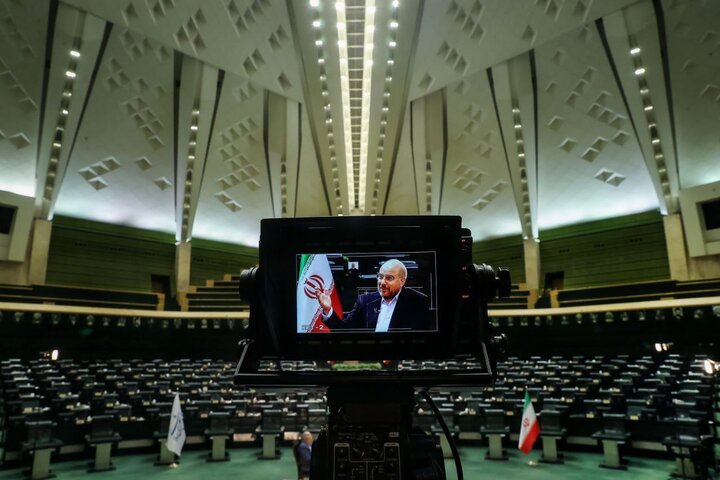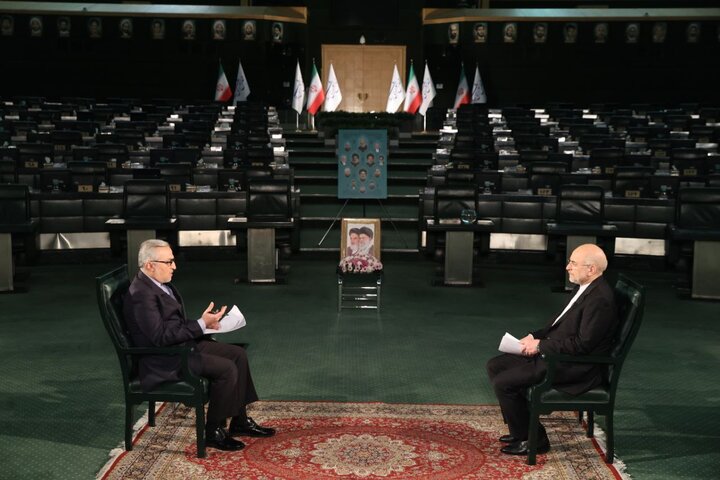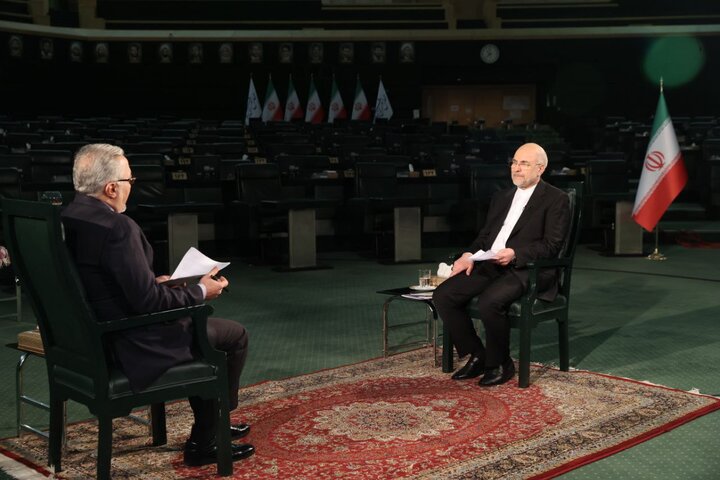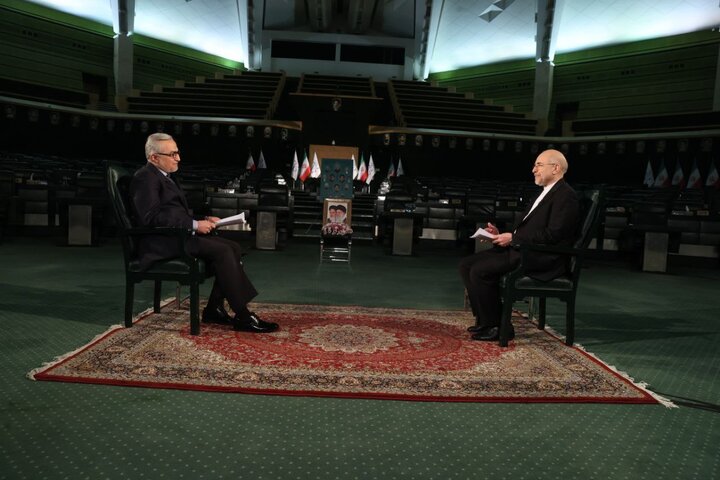The Speaker of the Islamic Consultative Assembly stated that in 1404, electronic inventory will be presented every month, and continued: "The electronic inventory is intended to be presented every month and this will proceed in this way."
According to Ashura News, citing Mehr reporter, Mohammad Baqer Qalibaf, the Speaker of the Islamic Consultative Assembly, appeared in a live television interview.
Regarding the measures taken by the Assembly to improve the livelihood of the people, the Speaker of the Islamic Consultative Assembly said: Inflation is a long-term issue, and for 7 to 8 years, inflation has fluctuated between 30 and 40 percent, which has caused people's resentment and hardship.
Qalibaf continued: Last year, efforts were made to reduce inflation from 40 percent to about 30 percent.
He added: Our duty in the Assembly is to legislate, meaning to eliminate and correct legal gaps by correctly identifying issues, conducting studies by the Research Center of the Assembly, and consulting with elites.
Qalibaf said: We have a legislative duty in the Islamic Consultative Assembly and we must correctly identify and examine issues. We are seeking to correctly identify and correct the legal gaps that exist, and this is our most important duty.
The Speaker of the Islamic Consultative Assembly stated: The 11th Parliament took fundamental steps to curb inflation and pay attention to the people's livelihood, and granting electronic goods receipts was one of these measures.
He continued: The Financing System Law was one of the most important laws of the 11th Parliament, which provided great capacities for governments in the field of investment, but some of its regulations have not yet been prepared.

The electronic bill plan is not specific to the holy month of Ramadan
Referring to the review of bills in the parliament in the past four months, he said: Every bill that the government has agreed with other governments that have two important issues - such as economic issues and the exchange of prisoners' extradition - has been considered by the parliament. Therefore, we have approved perhaps more than 12 to 13 bills in these sectors in the past period, and one of them was related to the Eurasian bill, in which more than 800 tariff items have been removed in that sector.
Referring to the prediction of the electronic bill in the field of preventing and controlling inflation, he said: In the current economic conditions and until we reduce inflation to single digits, this issue may take time. We have decided in the parliament and have also negotiated with the government, and the laws also state that we can provide some of the basic goods to the people with the electronic bill.
He added: These goods can be food and 10 to 11 basic goods that are the main food of the people. This issue will also be considered in the discussion of medicine and basic household appliances.
The Speaker of the Islamic Consultative Assembly continued by stating that the implementation of the electronic bill plan is not specific to the holy month of Ramadan, and continued: Our plan with the government is based on providing an electronic bill of lading as a support umbrella for the seven tenths, especially the three tenths of the poor.
The Speaker of the Islamic Consultative Assembly, stating that 10 months have passed since the 12th Assembly, said: Part of the time of the 12th Assembly was dedicated to the formation of the Assembly and the vote of confidence of the cabinet, and in fact, three to four months of useful work was done, but fundamental steps were taken in relation to the discussion of inflation and attention to the weakest segments of society in the 11th Assembly.
He continued: A clear example was in the field of electronic bill of lading, which was supposed to be implemented in 1401, but was delayed due to lack of preparation and infrastructure. In the 13th government, its infrastructure was prepared and payment began a few days ago.
Ghalibaf stated: The 11th Parliament started its work in the economic field with the slogan of economic issues in the legislative field, and we had a roadmap in this direction. Examples of these are the laws related to income in the field of taxation, attention to the financing system, the Central Bank Law, and the amendment to the law on smuggling of currency and goods, but some of these laws were implemented and others were not implemented.
Ghalibaf emphasized: The Parliament has fulfilled its legislative duty, of course, we are ready to help the government, especially in the field of electronic inventory, there have been predictions in the budget for 1404 and in the Seventh Plan.
In 1404, electronic inventory will be presented every month
He emphasized: We emphasized in the law that whatever the salary increase that occurs for these groups, - for example, if this year's salary increase is considered to be 20 to 30 percent - we will not allow these items to increase in price more than the salary increase during the year. Therefore, with this electronic inventory, we can achieve a maximum increase of 20 percent for the same price.
He stated that in 1404, the electronic bill of lading will be presented every month, and continued: The electronic bill of lading is supposed to be presented every month and this will proceed in this way. Therefore, the goal of the government and the parliament is to make the preferential currency that we allocate at the beginning of the chain practically targeted and allocate it directly to the individuals themselves and through the bill of lading.
In response to a question about whether sustainable resources have been foreseen to provide electronic bills of lading, the speaker of the Islamic Consultative Assembly stated: The necessary resources have been foreseen in the Seventh Plan and the budget.
Stating that we provide foreign exchange support for goods, Ghalibaf stated: In some cases, we allocate 4200 tomans of foreign exchange, and in the case of goods, 28500 tomans of foreign exchange will be allocated, and these cases will be a very significant amount.
The speaker of the Islamic Consultative Assembly clarified: We give these currencies to people who import inputs. Therefore, until these goods reach the consumer, part of it does not reach the target community. Therefore, I emphasize that the resources for this issue have been seen correctly.
Stating that the National Development Fund will not be withdrawn to provide resources for the implementation of the electronic inventory, he said: The resources for this issue have been correctly predicted in the annual budget and will be provided from this source.
The Speaker of the Islamic Consultative Assembly continued: We will use part of the foreign exchange to provide resources for the electronic inventory. Also, in 1403, 15 billion dollars and, in other words, 12 billion euros have been predicted for this issue.
He continued: Therefore, part of the currency allocated to basic goods will be eliminated and naturally, this issue will be available to the consumer in the future. Therefore, its resources will be seen on the inventory.
He continued: We have resources and we want to subsidize the people in this way and it must be said that we have no other two options. Therefore, either we have to spend the resources at the beginning of the chain or at the end of the chain. Hence, the decision is that these resources will be spent at the end of the chain.
The head of the legislative branch emphasized: "Our prediction is that the implementation of this plan will lead to people's satisfaction, and this satisfaction will exceed the existing conditions. Unfortunately, we are spending a lot of money in this sector, but people are not satisfied."

The government is not responsible for building housing and the government should provide land to the people
The speaker of the Islamic Consultative Assembly said regarding land hoarding: "One of the good things the Assembly has done is related to housing. We did not have a law on the relationship between tenant and landlord, but this issue was made into a law and promulgated so that prices would not run wild."
He continued: "Another issue is about a tax on empty houses so that houses would not be hoarded and sold in the marginal market, because some investors and banks invested money in mass construction and sometimes the houses remained empty for 5 years and they were not worried because they also made a profit with the increase in prices."
He noted: "The 11th Assembly passed a tax on empty houses, which means that if houses remain empty and are not rented out, they must pay a tax, and this tax is also progressive."
Qalibaf stated: The performance of the law on taxing empty houses has been weak, and we are following up on the relevant system to move forward and we will help the government to do this.
Stating that housing has three issues: production, rental, and hoarding, Qalibaf said: We pursued the issue of rental and hoarding by passing the law.
He continued: The Eleventh Parliament passed two laws on the housing production boom and the knowledge-based production boom. In the Seventh Plan, it was also predicted that two-tenths of a percent, or about 300,000 hectares, of land in the housing sector would be given to those who, despite having the conditions, do not have housing.
The Speaker of the Islamic Consultative Assembly clarified: We believe that the government is not responsible for housing construction and the government should provide land to the people.
Regarding the government's performance in this regard, Qalibaf said: According to reports, they were successful in some provinces and not successful in others. The Mehr Housing Plan has not yet reached 2 million housing units, and nearly 150,000 of those houses have not been completed or their infrastructure has not been prepared.
Qalibaf emphasized: "We are not going to build dormitories, but people need ancillary services such as health, treatment, green space, and transportation. So we should allow people and the private sector to build housing. The government also agrees that in many places, people should be given land to build their own housing."
He added: "Now, there is no attraction in big cities, and we should go to cities with less than 300,000 people and provide them with job opportunities and facilities."
Qalibaf emphasized: "We have made those we want to make homeowners indebted to banks, who are also busy paying rent. The most important livelihood aid is housing construction. The government should give land to the people, and the people should reach an agreement with investors about that land. Of course, the government should give this land to mass builders and not build houses itself."
We must both try to neutralize the sanctions and lift them
Regarding Trump's letter and the Islamic Republic's response to it, Ghalibaf said: Regarding Trump's letter, the Foreign Ministry is naturally following the issue and will definitely prepare a response. But what is clear is that Trump's actions during his first term as president were clear. They came and shamelessly tore up the agreement that the US government had committed to and signed in the JCPOA without any discussion or introduction and unilaterally ended it.
He added: About 20 days ago, this same Trump presented his policy towards Iran in the form of an executive order. Trump said in that order that Iran must collect and control its nuclear and missile programs, and even control unconventional weapons such as drones, etc. However, there was no mention of Iran's benefits if it did these things and imposed restrictions.
Qalibaf noted: Trump first issues a decree and says, "First do this and voluntarily accept my coercion and force, then come and see what you say." What kind of negotiation is this? Of course, we are not saying that we are not negotiating. We are committed to the JCPOA, and the other five countries that remain in the JCPOA are three European countries, China, and Russia. In the negotiations on the JCPOA, we negotiate on the condition of economic benefit for the country.
He emphasized: "When we talk about benefit, it means that our central bank can conduct its commercial and monetary transactions, that means we must be able to export our oil, that means our transportation and shipping can establish their insurance, countries that can invest should come and invest. But regardless of what Trump wrote in the letter, it will be clear, but so far his words have been contrary to this.
The Speaker of the Islamic Consultative Assembly continued: We must follow up on the discussions we have with those five countries, talk and advance our work, and use the great opportunities I just mentioned. That is, we must both work to neutralize the sanctions and work to lift the sanctions in the field of diplomacy.
He emphasized: For all important and path-breaking measures for the country, there must be cohesion; because in Mr. Pezzekian’s words, “unanimity,” in the words of the Leader of the Revolution, “cohesion,” and in our words in the government of Shahid Raisi, “empathy and cooperation.” Together, the parliament, the government, and the people can do these things and make these difficult and really easy decisions together and move forward.

Hemmati's weak defense of himself was an important factor in the vote to impeach him
Regarding the conditions of the agreement between the government and the parliament and the effect of the impeachment of the Minister of Economy on this issue, Ghalibaf stated: In any case, the parliament has duties and tasks and must fulfill its inherent duties. Of course, there were sometimes differences between friends and colleagues. Some said that we should still give a few months of time, and some said no, there is no need for time. But it is not the case that an impeachment wants to disrupt the agreement. The parliament and the government are really coherent in resolving economic issues, of which Kalaberg is an example. Or another example is the energy issue that we are seriously pursuing. In the renewable energy issue, we are all moving together in harmony and moving forward.
Regarding the reason for the high vote of the representatives in the impeachment of the Minister of Economy, the Speaker of the Parliament said: In my opinion, he did not defend himself well. In my opinion, as I was in the parliament, it was possible that he would vote by a small margin or not vote by a small margin until noon, but his weak defense, which did not even use his 30 minutes of time and only used 9 minutes, convinced the share of the strong defense that the impeaching representatives had in the afternoon, and the parliament voted 182.
He emphasized: In my opinion, it was not a political issue, it was a purely economic issue. We consider it our duty to both monitor and really arrest the government and help it. In my opinion, the government, ministers, and Mr. President have this feeling, and in addition, the parliament has the same belief that it should help the government. I hope that we can take these good steps together with the government this year and that we can reduce the problems.
The government and parliament are creating the necessary conditions for the implementation of the law on hijab and modesty
Regarding the issue of the announcement of the law on chastity and modesty, whether the Supreme National Security Council can prevent the implementation of the parliament's resolutions, and whether the government fulfilled its duty in implementing the law, Qalibaf stated: Regarding the issue of hijab, as the Leader of the Revolution said, it is both a religious issue and a political issue, and it is the duty of all of us. Without a doubt, our general public is a religious people, and the concepts of hijab and modesty are concepts that are intertwined with our Iranian and Islamic culture.
He added: We already have a hijab law. Naturally, before this law, hijab had a law, and that law is in place and is being followed, and the government is also active in this sector. So now we have a law and there is no legal vacuum in this regard. It was intended to come up with a law that pays attention to both the positive parts and the negative parts of the law.
He emphasized: This law, which consists of 5 chapters, 4 of which are related to positive issues. Part of it is also related to the negative part, the difference from the previous law is that there is no prison, no flogging, no guidance patrol, and it deals more with fines and cash penalties. Of course, the law also has some problems. The government is aware of these problems, and the government is supposed to reflect those problems so that we can correct them before they are announced.
Regarding the reason for the suspension of this law, Qalibaf said: As the speaker of the parliament, I am obliged to announce when a law is passed and comes from the Guardian Council. But because of these discussions that occurred, the Secretariat of the Supreme National Security Council, based on the powers that this secretariat has, felt that this might cause tensions in the current social atmosphere because it was right at the same time as the issues of 1401. Their plan was to delay this. The Secretariat brought this proposal, which was within its authority and could be implemented, to the Supreme National Security Council, where it raised it with all members present, and the Supreme National Security Council made this decision and ratified this decision. The Secretariat did not notify me of this issue in writing. Naturally, when this issue is notified to me, I have a legal duty to comply with it. Other than this, any talk that Qalibaf or someone else is preventing it, etc., are sidelines of the discussion.
He emphasized: When a law is to be implemented, it must be implemented, and to be fair, the government is currently preparing the ground for this law, and right now the parliament and the government are actively pursuing the ground for this law to be prepared, to have the necessary equipment and facilities, and to prepare the necessary regulations, and we are not wasting any time.










Post a comment